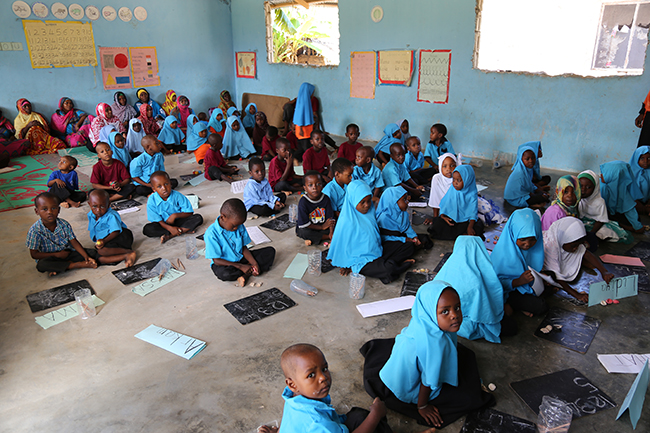The children in kindergarten at Kisiwandui primary school in Zanzibar looked like they had a lot of fun when I visited their classroom. Amid showing them new words and the corresponding images in their textbooks, their teacher sang songs with them, and did several quick physical exercises like jumping and dancing to keep their attention.
With a half wall open to the school’s large courtyard, the classroom was bright and lively, with furniture adapted to the student’s age, many posters on the walls of images and words, and letter and number cards hanging from the ceiling. The classroom included one boy with a mental disability, who seemed to be having as much fun at his classmates.
Communities organize early learning
“Moja, mbili, tatu, nne, tano!” (one, two, three, four, five). At Mnyimbi TuTu center in the North province, children aged 3 to 5 sat on the concrete floor of their one-room school and learned to count, using stones, shells or wooden blocks and repeating the numbers first together then individually as called upon by their two teachers.

Children in a pre-primary classroom at Kisiwandui primary school in Zanzibar learn new words through looking at images in their textbooks and repeating them after their teacher.
Photo Credit: GPE/Chantal Rigaud
The community preschool was built in 2013 and welcomes 31 girls and 23 boys from the village aged 3 to 5 (the 3-year olds usually follow an older brother or sister to school).
Mzee Othman Abdalla, the village chief, is proud of the school and parents are happy that their children have the opportunity to start learning earlier than they did.
A few mothers and fathers come to school every day to help out. None of them attended preschool, and they remember having to walk a long distance to go to primary school.
Making preschool accessible to more children
There are 77 such TuTu centers in the North, and 299 overall around Zanzibar. TuTu is short for Tucheze Tuchifunze, which means learning through play. The centers were set up to respond to the demand by communities to be able to send their young children to preschool in locations close to their community.
The preschool in Mnyimbi was built by the community. The two teachers, Amina and Mwasuma, in their early 20s, are from the village. When they heard from the village chief that a school would open, they volunteered to become teachers. Both have finished secondary school and have received two short trainings on pedagogical techniques to handle children. They also said they would welcome more training.
Expanding pre-primary education to more children
According to the draft ZEDP (2017-2021) The pre-primary system in Zanzibar has expanded its capacity over the past six years, and enrollments have almost doubled, with the growth concentrated in public (government-run) schools. Zanzibar’s policy, adopted in 2006, is that all children should be able access 2 years of pre-primary education before enrolling in the first year of primary at the age of 6.
To date, Zanzibar estimates that between a quarter and half of its children have access to preschool. Many of those who are enrolled are over-age. Of total enrollments, 55% are enrolled in privately run preschools (both private schools and Madrasa community schools), and the rest in government schools or Tutu centers.
Access to pre-primary education is uneven depending on location, with only 18% of children in rural areas enrolled. There is currently an average of 21 students per teacher at the pre-primary level, but Zanzibar would like to reduce this to 15 students per teacher to improve learning.
GPE supports Zanzibar’s pre-primary goals
Zanzibar received a GPE grant of US$5.2 million in 2013, which was implemented over three years until the end of 2016. Its overall objective was to improve student learning, and one of its component was to expand and strengthen pre-primary programs such as the TuTu centers.

The Mnyimbi TuTu Center welcomes 54 children from the village. Some parents also come to school to help out the two teachers.
Photo Credit: GPE/Chantal Rigaud
Through the grant, Zanzibar established an additional 30 pre-primary education centers and trained more than 300 pre-primary teachers.
The government is satisfied with the results, but wants to do more. Its next 5-year plan, the Zanzibar Education Sector Development Plan (ZEDP II), which is currently being finalized, includes the objective to increase the proportion of pre-primary enrollments from 27,5% currently to 50% by 2020, with the majority of children attending government schools, and the phasing out of TuTu centers.
The plan also calls for better quality learning in preschool to ensure that children master basic skills when they enter primary school and for better coordination among the ministries and departments responsible for early learning.
GPE, UNICEF (coordinating agency), Sweden (grant agent for the GPE grant) and other development partners are ready to support the government of Zanzibar to ensure that more children get access to quality early learning.
